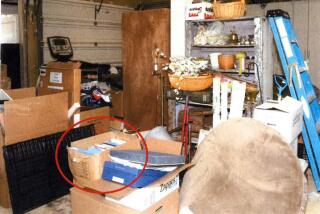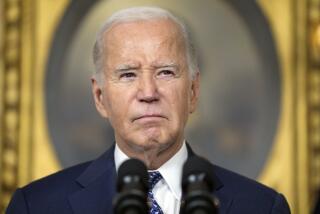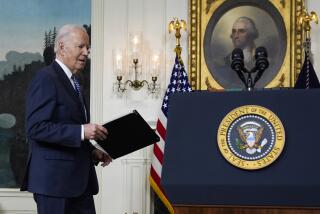A Bluff That Worked Too Well
- Share via
The head of the CIA’s weapons-hunting team dropped 1,000 pages worth of anticlimax on the table Wednesday, pointing out what the world has known for well over a year: Iraq did not possess chemical, biological or nuclear weapons when the United States went to war last year. If a molecule of enriched uranium or a vial of anthrax had been found, trumpets would have sounded long before this.
President Bush’s justifications for war are many and still changing, but the argument that it was needed to force Iraq to comply with years of U.N. Security Council demands that it get rid of weapons of mass destruction has been ground into the dust yet again. There was nothing to disarm.
The report is a devastating indictment of U.S. and allied intelligence agencies that assumed Iraq must have had arsenals prohibited by United Nations sanctions. Those assumptions were erroneous, but they were not harebrained.
In his book “Disarming Iraq,” Hans Blix, former director of the U.N. Inspection Commission and an opponent of the invasion, states that U.N. inspections -- which resumed shortly before the war after inspectors had been expelled years earlier -- were making progress but had not resolved whether Iraq still possessed banned weapons. Even Saddam Hussein’s leading generals thought the country at least had chemical weapons of the type used in its war against Iran more than a decade earlier. The report says the military leaders were amazed when Hussein told them shortly before the invasion that there were no such weapons.
Hussein’s deceptions were intended to keep Iran at bay, but when he claimed on the eve of war not to have the weapons, he had no credibility. U.S. officials, who made intelligence seem more certain than it was and who were eager to believe defectors’ lies, were in no mood to listen. There were few vigorous rebuttals to their findings.
Charles A. Duelfer, who released the report, was head of the CIA’s team of weapons hunters in Iraq. Wednesday, he told the Senate Armed Services Committee that Hussein had actually complied with U.N. demands after his ignominious defeat in the 1991 Gulf War.
Iraq got rid of its chemical and biological weapons -- it never had nuclear weapons -- and never rebuilt its illicit-weapons programs.
But Duelfer also reported that Hussein hoped someday to reconstitute the deadly weapons programs once the U.N. ended its sanctions. And his report on Hussein’s ability to siphon billions of dollars from the U.N.-authorized oil-for-food program shows the dictator could have become dangerous again if other nations had dropped their guard, as many seemed willing to do.
The report certainly indicates that Hussein was dangerous and may someday have become a threat. But the chief argument for the Iraq war remains thoroughly discredited.
Hussein was not a military danger to the United States or even his own region at the time he was overthrown, no matter how thoroughly he pretended to be one.
More to Read
Sign up for Essential California
The most important California stories and recommendations in your inbox every morning.
You may occasionally receive promotional content from the Los Angeles Times.










